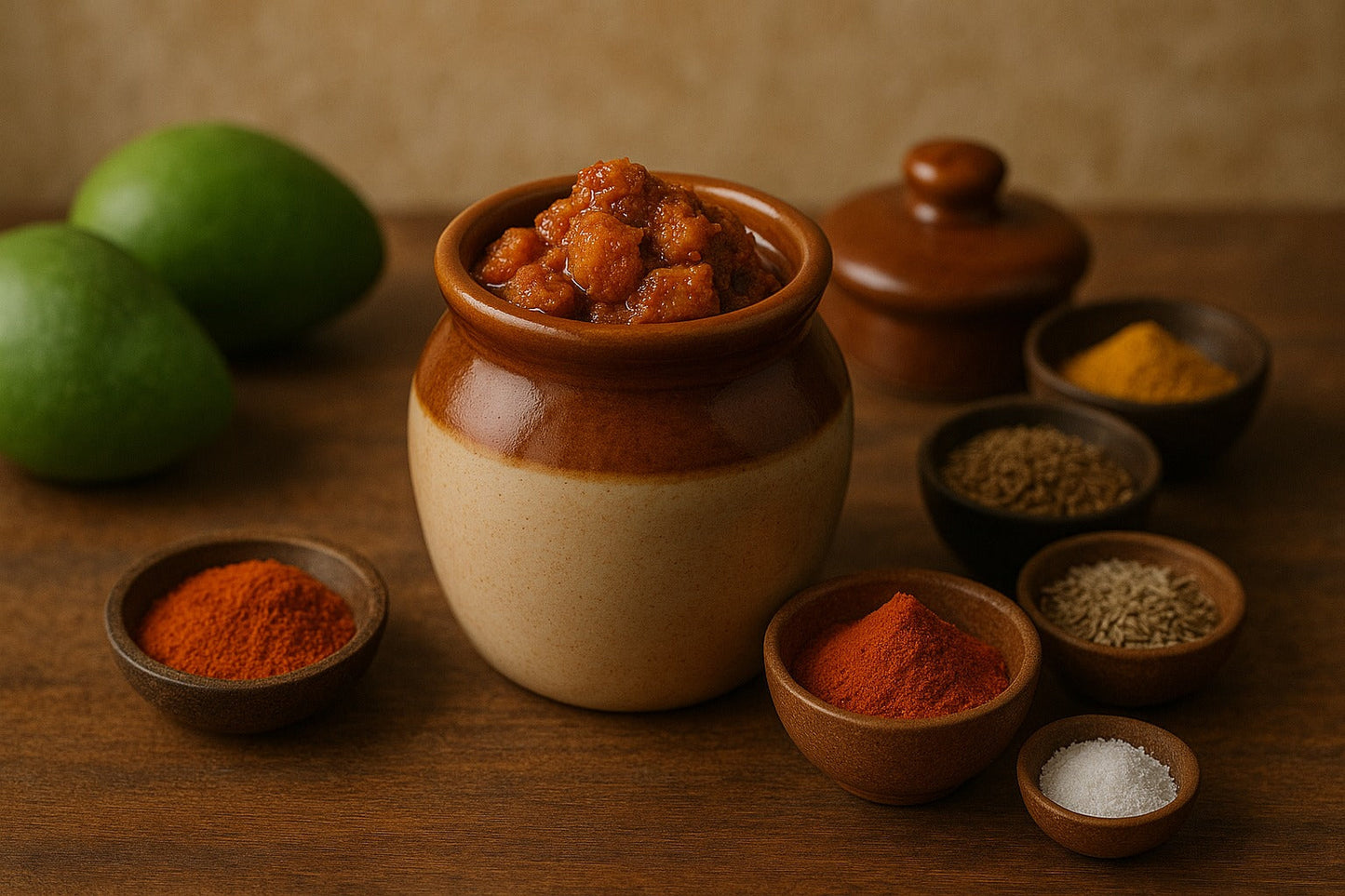
Indian pickles, or achars, have been a cherished part of our culinary heritage for centuries. From spicy mango pickle to tangy lemon achar, these condiments add a burst of flavor to any meal—whether it’s dal-chawal, paratha, or khichdi. But beyond the punch of taste, many health-conscious Indians are now asking: Are pickles healthy?
In this blog, we’ll explore the health benefits and potential drawbacks of these pickles, so you can decide how they fit into your daily diet.
Indian Pickles:
Indian pickles are made by preserving vegetables or fruits in oil, salt, spices, and sometimes natural acids like lemon juice or vinegar. The most common varieties include:
- Mango (Aam) Pickle: Often made during summer, using raw mangoes and a mix of mustard oil, spices like fenugreek and fennel.
- Lemon Pickle: Tangy, made with whole or sliced lemons.
- Chili, Carrot, Garlic, or Mixed Pickles: Featuring seasonal ingredients and bold spice blends.
Unlike Western pickles, which are mostly brined in vinegar, Indian pickles use natural preservation methods either through sun-drying or fermentation using salt and oil.
Types of Indian Pickles:
-
Fermented Pickles
These are naturally fermented using salt and sunlight, encouraging the growth of healthy bacteria (lactic acid bacteria), which act as probiotics. Many traditional homemade achars, especially lemon or green chili varieties fall into this category. -
Oil-Based Pickles
The most common form in India, these are preserved in mustard oil or sesame oil along with salt and spices. Though not probiotically rich, they are long lasting and deeply flavorful.
Health Benefits of Indian Pickles
Despite their intense flavors, Indian pickles can offer several health benefits when made and consumed mindfully.
- Probiotics for Gut Health
Fermented pickles, such as homemade lemon achar or kanji-style pickles, are naturally probiotic. These good bacteria help maintain a healthy gut flora, which supports digestion, immunity, and even mental well-being.
However, not all commercial pickles are fermented; many are cooked or preserved with vinegar or oil, which do not offer probiotic benefits. -
Rich in Antioxidants and Phytochemicals
Spices like turmeric, mustard seeds, fenugreek (methi), garlic, and asafoetida (hing) commonly used in Indian pickles are packed with antioxidants. These help combat oxidative stress and inflammation in the body, potentially reducing the risk of chronic diseases.
-
Aids Digestion
Many pickles are made with digestive spices such as ajwain (carom seeds), hing, and fennel, which can help reduce bloating and support smoother digestion. A small amount of achar with a heavy meal can help stimulate appetite and digestive enzymes.
-
Low Calorie but High Flavor
A small serving (1 tsp) of pickle contains intense flavor with minimal calories. When used in moderation, it can enhance bland meals without the need for excessive fat or sugar.
Potential Drawbacks of Indian Pickles
Like most good things, the key is moderation. Indian pickles do come with a few potential health concerns:
- Excess Oil
While mustard or sesame oil has health benefits in small quantities (rich in healthy fats and antibacterial properties), store bought pickles which are made in factories can sometimes contain excess or reheated oils, which are not ideal for daily consumption.
-
Digestive Sensitivity for Some
Spices and fermented ingredients can irritate the stomach in some individuals, especially those with acidity or ulcers. If you feel discomfort, heartburn, or bloating after eating pickles, reduce the portion or avoid spicier varieties.
-
Chemical Preservatives and Additives
Many mass produced pickles may contain synthetic preservatives, artificial colors, or refined sugar. Always read the label carefully and prefer homemade or artisanal brands using clean, natural ingredients.
If you don’t have the time to make pickles at home you can put your trust in Farmdidi to
provide you with authentic homemade pickles which are free from chemical preservatives
and are made in small batches unlike other store-bought pickles which are mass produced in factories.
Conclusion: Should You Include Indian Pickles in Your Diet?
Yes, but wisely.
Indian pickles can be a flavorful and even nutritious addition to yourdiet. When made traditionally using natural fermentation, quality spices, and clean ingredients they offer digestive support, antioxidants, and gut friendly benefits.
However, the salt, oil, and spice content means moderation is crucial. A small spoonful with your meal is usually enough to enjoy the taste without overloading on sodium or fat.
Quick Tips:
- Opt for homemade or artisanal pickles with clean labels.
- Choose sun-dried pickles, the way they have been traditionally made at home.
- Avoid pickles with artificial preservatives.
If you are a fan of pickles that add flavour to your meals but are sceptical about thefactory made pickles and their potential health concerns then you should try Farmdidi’s Homemade Pickles which are made traditionally the way they have been in our homes since ages without any chemical preservatives and additives. You can enjoy Farmdidi’s pickles without worrying about excess oil, artificial colours and chemical preservatives.
